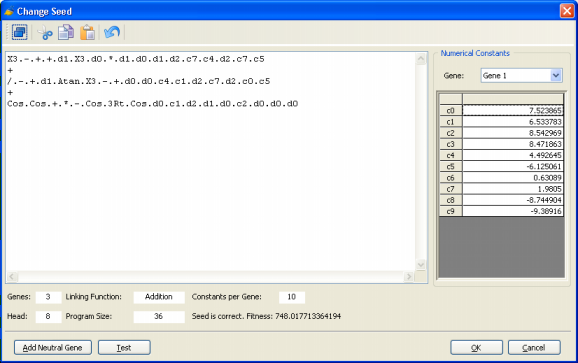In order to simplify a model with GeneXproTools 4.0, first you must either evolve one or enter an existing model through the
Change
Seed window (see
the chapter Designing New Models from Old Models).
GeneXproTools 4.0 offers three different ways of simplifying an existing model. Follow the next steps to explore all of them.
To Simplify a Model Previously Evolved by GeneXproTools 4.0
- In the Run Panel, click the
Simplify button.
This is the simplest way of simplifying a model using GeneXproTools 4.0. This can be done for as long as you wish or until
you feel the program is as parsimonious as it will get. By
monitoring the plots Avg/Best Size and Sub-Program Sizes as well
as the Heat Map in the Run Panel, you will know exactly how the
simplification process is progressing.
- Go to the Settings Menu and choose Fitness Function.
By checking the box With Parsimony Pressure, GeneXproTools will
select your models also according to their size.
- Then in the Run Panel, click the Optimize button.
This is very similar to the previous form of simplifying a model.
The only difference is that you are always factoring the program
size into the fitness, even if you are just trying to optimize a
model. For most problems, we recommend you to use a fitness
function without parsimony pressure in the initial stages of
evolution and then apply parsimony pressure when you are happy
with it by clicking the Simplify button.
- Go to the Edit Menu and choose Change
Seed.
The last not so simple way of simplifying a model using GeneXproTools 4.0
is doing it by hand through the direct modification of the seed. For instance, you can replace any node
(function or terminal) in the head by another and any terminal in the tail by another terminal; you can also fine-tune a numerical constant in your seed; and so forth.
Note, however, that if your modifications are worse that the original model, they will most probably be lost in the evolutionary process.
By clicking the Test button you can verify that your changes
didn't result in a decrease in fitness.

|
|
